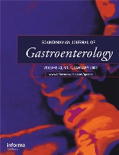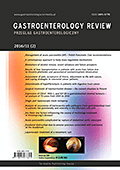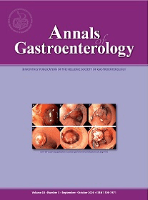
United European Gastroenterology Journal
Scope & Guideline
Empowering research for better patient outcomes.
Introduction
Aims and Scopes
- Gastrointestinal Diseases Research:
The journal covers a wide array of gastrointestinal diseases, including inflammatory bowel disease (IBD), liver diseases, and pancreatic conditions, emphasizing novel findings and treatment strategies. - Clinical Guidelines and Best Practices:
It publishes clinical guidelines and consensus statements, aiming to standardize and improve the management of gastrointestinal disorders, ensuring that clinical practice aligns with the latest evidence. - Translational and Applied Research:
Research that bridges the gap between laboratory findings and clinical application is a focus, with studies that explore the mechanisms underlying diseases and potential therapeutic interventions. - Emerging Technologies and Innovations:
The journal highlights advancements in medical technology, including artificial intelligence, endoscopic techniques, and novel biomarkers for disease diagnosis and management. - Patient-Centered Care:
There is a strong emphasis on patient perspectives, preferences, and quality of life, with research exploring how treatments affect patient outcomes and their experiences with gastrointestinal diseases.
Trending and Emerging
- Artificial Intelligence in Gastroenterology:
There is a growing trend towards integrating artificial intelligence in diagnostics and treatment planning, with studies focusing on AI applications in endoscopy, imaging, and patient data analysis. - Microbiome Research:
Research on the gut microbiome's role in health and disease is gaining attention, with studies exploring how microbiota composition impacts gastrointestinal conditions and overall health outcomes. - Personalized Medicine and Targeted Therapies:
Emerging interest in personalized treatment approaches for gastrointestinal diseases, particularly in IBD and liver diseases, reflects a shift towards tailoring therapies based on individual patient characteristics. - Patient-Reported Outcomes and Quality of Life:
There is an increasing emphasis on understanding patient-reported outcomes and the impact of gastrointestinal diseases on quality of life, driving research that prioritizes patient experiences. - Innovations in Endoscopic Techniques:
The journal is witnessing a surge in studies related to advancements in endoscopic procedures, including novel techniques and technologies that enhance diagnostic and therapeutic capabilities.
Declining or Waning
- Traditional Diagnostic Methods:
There is a noticeable decline in studies focusing on conventional diagnostic methods for gastrointestinal diseases, such as invasive biopsies, as newer, less invasive technologies gain traction. - Single-Disease Studies:
Research that exclusively targets single gastrointestinal diseases without considering comorbidities or broader health implications is becoming less common, indicating a shift towards a more integrated approach to patient care. - Generalized Treatment Protocols:
The focus on one-size-fits-all treatment protocols is waning, with increasing interest in personalized medicine approaches that tailor treatments to individual patient profiles and genetic backgrounds. - Historical Epidemiological Studies:
While epidemiological research remains important, there is a decrease in studies that solely document historical trends without addressing current challenges or innovative solutions. - Basic Science in Isolation:
Research that does not connect basic science findings to clinical applications is becoming less prevalent, as there is a stronger push towards translational research that has direct implications for patient care.
Similar Journals

Gastroenterology Research
Exploring the complexities of the gastrointestinal system.Gastroenterology Research is a prominent scholarly journal dedicated to advancing the field of gastroenterology. Published by ELMER PRESS INC, this journal serves as a vital platform for disseminating innovative research, clinical findings, and comprehensive reviews that explore the complexities of the gastrointestinal system. With an ISSN of 1918-2805 and an E-ISSN of 1918-2813, it reaches a global audience of researchers, healthcare professionals, and students eager to contribute to or keep abreast of the latest developments in gastroenterology. Though details such as the H-index and Scopus rankings are currently unspecified, the journal's commitment to quality and impact in the medical research community is evident. Gastroenterology Research aims to foster collaboration and knowledge sharing among experts, ultimately improving patient care and outcomes within this critical area of health science. Explore the cutting-edge studies published within its pages and engage with a community passionate about the investigation and treatment of gastrointestinal diseases.

Gastroenterology Insights
Elevating Knowledge in Gastroenterology and HepatologyGastroenterology Insights is a premier open-access journal published by MDPI since 2009, focusing on essential research and developments within the fields of gastroenterology and hepatology. With a dedicated ISSN of 2036-7414 and E-ISSN 2036-7422, this journal serves as a vital platform for disseminating innovative studies and insights pertinent to gastrointestinal health, disorders, and treatment modalities. Based in Switzerland, Gastroenterology Insights boasts a significant academic presence, currently positioned in the Q3 quartile for both gastroenterology and hepatology categories as of 2023, reflecting its impactful contributions to the disciplines. With Scopus rankings placing it at the 94th and 48th positions in gastroenterology and hepatology respectively, the journal is committed to advancing knowledge and fostering collaboration among researchers, professionals, and students alike. By providing an open-access model, it ensures that high-quality research is accessible globally, thereby enhancing the reach and impact of crucial findings in the science of digestive health. Researchers looking to publish cutting-edge work will find Gastroenterology Insights a valuable resource for both sharing and acquiring knowledge.

SCANDINAVIAN JOURNAL OF GASTROENTEROLOGY
Elevating Standards in Gastroenterology Through Scholarly InquirySCANDINAVIAN JOURNAL OF GASTROENTEROLOGY, published by Taylor & Francis Ltd, is a leading journal in the field of gastroenterology, dedicated to advancing clinical and experimental research related to digestive health. With an ISSN of 0036-5521 and an E-ISSN of 1502-7708, this journal provides a platform for high-quality research that addresses the complexities of gastrointestinal diseases. Since its inception in 1966, the journal has consistently contributed valuable insights and is currently categorized in the Q2 quartile of gastroenterology journals, reflecting its impact and relevance in the field, with a Scopus rank of 87 out of 167 in Medicine - Gastroenterology. Researchers and practitioners are encouraged to explore the journal's archives to enhance their understanding and stay abreast of innovative strategies for managing gastrointestinal disorders. The SCANDINAVIAN JOURNAL OF GASTROENTEROLOGY remains a crucial resource for those committed to improving patient outcomes through rigorous scientific inquiry and the sharing of impactful findings.

Minerva Gastroenterology
Transforming Knowledge into Practice in GastroenterologyMinerva Gastroenterology, published by EDIZIONI MINERVA MEDICA, is a notable academic journal dedicated to advancing the field of gastroenterology and related disciplines. With an ISSN of 2724-5985 and an E-ISSN of 2724-5365, this journal gathers innovative research from diverse areas including internal medicine, endocrinology, and metabolism. Though characterized by its open-access policies, Minerva Gastroenterology aims to provide a platform for high-quality scholarly articles with an emphasis on critical reviews, clinical studies, and translational research. Since its inception in 2021, the journal has managed to secure a reputation reflected in its Q3 rank across multiple categories in 2023, as well as its standing in Scopus rankings, positioning it in the 45th to 47th percentile among renowned medical journals. Situated in Turin, Italy, it fosters collaboration and knowledge-sharing among researchers and practitioners, making it an essential resource for those seeking to deepen their understanding of gastroenterological conditions and enhance clinical practices.

WORLD JOURNAL OF GASTROENTEROLOGY
Advancing the frontiers of digestive health.WORLD JOURNAL OF GASTROENTEROLOGY, published by BAISHIDENG PUBLISHING GROUP INC, stands at the forefront of gastrointestinal research, providing a critical platform for the dissemination of high-quality studies in the field. With an impressive impact factor reflected in its Q1 rankings in both Gastroenterology and Miscellaneous Medicine, this journal is recognized for its rigorous peer-review process and commitment to advancing knowledge and practices related to digestive health. Covering comprehensive scopes from clinical advancements to innovative therapies, the journal serves an essential role for researchers, clinicians, and students, enabling them to stay updated on the latest developments and findings from 1998 through 2024. The open access model facilitates broader accessibility, ensuring that groundbreaking research reaches a global audience. The journal's ranking within the top 15% of Scopus demonstrates its significant contribution to the academic community, making it a valuable resource for advancing the science of gastroenterology.

Gut and Liver
Transforming patient care through innovative research.Gut and Liver is a prestigious peer-reviewed journal dedicated to advancing the fields of Gastroenterology and Hepatology. Published by the EDITORIAL OFFICE GUT & LIVER in South Korea, this Open Access journal has been disseminating valuable research findings since 2007, making critical knowledge accessible to a global audience. With an impressive 2023 impact factor that places it in Q1 rank in both Gastroenterology (#28/167) and Hepatology (#22/82), it is recognized as a leader in the medical domain. The journal covers diverse topics, including innovative therapeutic strategies, clinical practices, and groundbreaking research in liver diseases and gastrointestinal disorders, thereby playing a vital role in improving patient care and outcomes. Researchers, healthcare professionals, and students can benefit from the journal's wealth of information, designed to foster collaboration and spark new ideas within the scientific community. For further engagement with current research, readers can access issues from 2009 to 2024 and stay updated on the latest advancements in the field.

Gastroenterology Review-Przeglad Gastroenterologiczny
Pioneering Insights in Gastrointestinal MedicineGastroenterology Review-Przeglad Gastroenterologiczny is a premier, peer-reviewed journal published by TERMEDIA PUBLISHING HOUSE LTD, focusing on the dynamic field of gastroenterology. Since its inception in 2006, it has embraced an Open Access model, ensuring that the latest research is readily accessible to a global audience, fostering collaboration and innovation. Based in Poland, this journal serves as a crucial platform for disseminating significant findings in gastrointestinal research, with a current Scopus rank placing it at the 39th percentile in its category. With a commitment to advancing the understanding of gastroenterological conditions, *Gastroenterology Review* publishes original articles, reviews, and case studies that contribute to both clinical practice and academic research. The journal is particularly aimed at researchers, healthcare professionals, and students who ignite dialogues that shape the future of gastrointestinal health. Explore the comprehensive insights that this journal offers, as it encapsulates vital developments from 2008 to 2024 in the ever-evolving landscape of gastroenterology.

Annals of Gastroenterology
Elevating the Standard of Gastrointestinal ResearchAnnals of Gastroenterology, published by the Hellenic Society of Gastroenterology, serves as a pivotal platform for advancing the field of gastroenterology, highlighting research that spans across the spectrum of gastrointestinal diseases and treatments. With an ISSN of 1108-7471 and E-ISSN of 1792-7463, this journal has established itself as a reputable source of scholarship since its inception in 2000, converging valuable insights through to 2024. Ranking within Q2 of its category and achieving a respectable 78th position out of 167 in the Scopus rankings, the journal holds a strong presence in the academic community, appealing to researchers, clinicians, and students alike. Although not an open access publication, Annals of Gastroenterology is dedicated to disseminating high-quality research that aids in the understanding and treatment of gastrointestinal conditions, making it an essential reference point for those engaged in this dynamic field.

Translational Gastroenterology and Hepatology
Unlocking Innovations for Liver and Gut Health.Translational Gastroenterology and Hepatology, published by AME Publishing Company, stands as a pivotal platform for advancing the understanding and treatment of gastrointestinal and liver diseases. With its focus on translational research, this journal aims to bridge the gap between laboratory discoveries and clinical applications, thus fostering improvements in patient care. Although specific metrics like H-Index and Scopus ranks are currently unavailable, the journal is committed to maintaining high standards of scholarly communication and excellence. As an open-access publication, it ensures that valuable findings are readily accessible to a global audience, promoting collaboration and innovation among researchers, clinicians, and healthcare professionals invested in gastroenterology and hepatology. The journal's dedication to disseminating groundbreaking research makes it an essential resource for those seeking to stay at the forefront of these ever-evolving fields.

Clinical Gastroenterology and Hepatology
Transforming Knowledge into Clinical PracticeClinical Gastroenterology and Hepatology, published by Elsevier Science Inc, stands as a leading journal in the fields of gastroenterology and hepatology. With an ISSN of 1542-3565 and an E-ISSN of 1542-7714, this esteemed publication has earned its place in the top quartile (Q1) of both gastroenterology and hepatology categories as of 2023, ranking 6th out of 167 and 7th out of 82 respectively. The journal aims to disseminate innovative research, clinical studies, and case reports that advance the understanding and treatment of gastrointestinal and liver diseases. Targeted towards researchers, healthcare professionals, and students, it provides crucial insights into emerging therapies and medical advancements. Clinical Gastroenterology and Hepatology is not only a pivotal resource for contemporary gastroenterological research but also fosters collaboration and knowledge-sharing within the medical community. With a converging publication history from 2003 to the present, the journal continues to build on its solid foundation of scientific excellence and relevance.